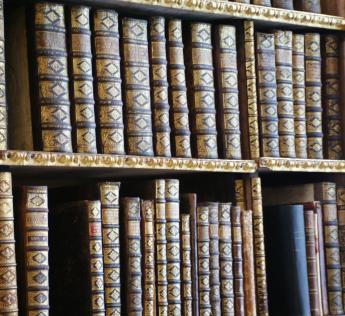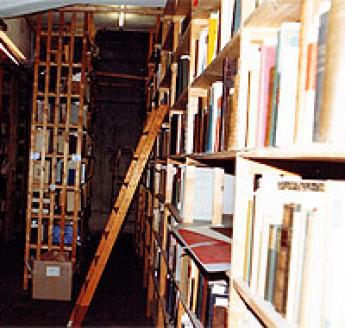The Australian and New Zealand Association of Antiquarian Booksellers Antique Bookshop & Curios
Organising the Private Book Collection

By Peter Tinslay
Background
You’ve been buying books for a while now but in a haphazard fashion, buying them as the subject matter or some other aspect of them e.g., binding or association inscriptions, illustrations or bookplates or indeed anything at all, appealed to you. There are so many of them now that you begin to think that you have a “collection”, particularly as you now seem to be mostly buying books in a field which has become of particular interest to you. The problem is that you have just put them on any available space on the shelf so it’s hard to find the book you want and it’s difficult to remember just what you already have when you’re browsing in a bookshop. Should you buy the book you have in your hand? It seems vaguely familiar but is it because you already have it or have seen it elsewhere? When you have reached this point it is time to seriously consider organising your collection.
Solution - Step 1
The first step is to organise your books on the shelves in the bookcase or bookcases you have. In what manner should you do this? The standard method, and lets not talk about Dewey numbers and other large library sophistications, is to arrange them alphabetically in author order within subject groups. If you have a collection of bindings, for example, then it may look attractive to keep them together on the shelf but put them in author order so you can find them readily. You can order them in whatever way you wish, but once started, keep to the system you’ve decided upon. I once purchased books from a private collection arranged in title order. It was quite a disorienting experience for me but if it works for you then by all means do it. This type of arrangement makes it difficult if for example you wish to find all your P.G.Wodehouse titles. “J” would be a good place to start but you may need to consult a bibliography if you don’t remember all the titles.
Solution - Step 2
I consider it a most excellent idea to enter the details of your books into a spreadsheet or database. Most people have Excel as part of Microsoft Office and this is ideal if you don’t need the more sophisticated refinements of a database such as File-Maker Pro or Access. Don’t for a moment think about just using a word processing program to type in the information as it’s too difficult to locate books according to particular criteria you might choose. In Excel, put each piece of information about the book in separate columns. There should be separate columns for author, title, place of publication, publisher, date, a brief description of the book, subject, any special characteristic such as inscription or bookplate, when purchased, where purchased and the price paid. You may choose to add other columns which you would keep updated, such as current market price. Once you have entered the details of the books you already have, then it is quite straightforward, and not at all onerous to enter additional books as you purchase them. Having done this you will then have a record of your collection and by summing the price column, how much you have expended, though you may prefer not to know this! By putting the data in a spreadsheet or database you have the ability to sort it into any order you desire or to filter it to find particular characteristics. If you wish, you can quickly find the books published by George Bell & Sons, the books published in Melbourne between 1930 and 1940, the books written by Fergus Hume, any monographs on Charles Blackman, the books you paid over $500 for, or indeed any combination of characteristics you choose.
Footnote
If you only intend to have a shelf of books then the above advice can be ignored but if your collection is growing, I highly recommend keeping it properly organised.
The article was first published in the “ANZAAB Aspects of Book Collecting” on www.anzaab.org, and it presented here, with our thanks, by permission of Peter Tinslay (ANZAAB President, Antique Bookshop & Curios)

